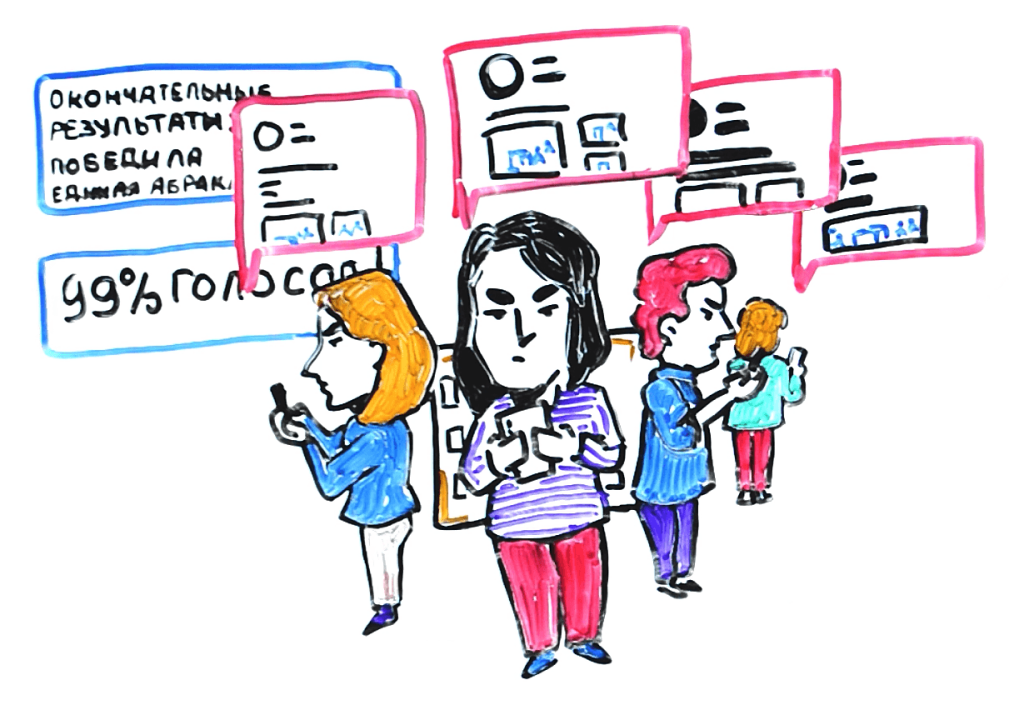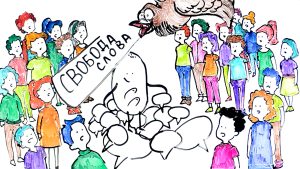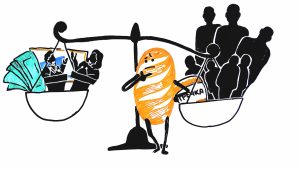Non-governmental organizations, foundations, volunteers, bloggers, activists, independent experts – they all constitute civil society. This is a set of private initiatives, informal movements and registered organizations. They represent the interests of individual professionals, social, religious groups or society as a whole. Despite the abstractness of the concept and not always tangible activities, civil society performs an important function of control. When human rights are violated, when cases of environmental pollution are discovered, when cultural and social life needs to be improved, citizens voice the problem, unite and do their best to solve it.
Political activities, such as submitting petitions, developing proposals and concepts to solve problems, calling for strikes and protests, strict criticism of public processes and government actions, and the civic impact on decision-making in the state are all integral parts of civil society.
Non-profit organizations monitor rights and identify cases of discrimination, provide education and assistance to the most disadvantaged groups, hold consultations and conferences. Activists and nongovernmental organizations launch campaigns, participate in public debates, and make demands for changes in laws. To achieve results, meetings are held with politicians where the positions of the state, business, and civil society are discussed based on the analysis of the current situation and conclusions of the experts. If a compromise cannot be reached, or if the state does not engage in a dialogue, activists launch campaigns on the internet, collect signatures from citizens, stage colorful street actions, and achieve a public response by all possible peaceful means.
Civil society institutions in Germany are very active. About 20 percent of German citizens are volunteers. They work in social centers for free or for a small fee, teach the language to refugees for free, collect money for victims of wars and natural disasters, organize youth clubs and sports clubs for children, unite with neighbors to improve their street and hold festivals. Most of the volunteers who work for free in community service spend an average of two hours a week doing this. There are some 600,000 civil society organizations in Germany’s “third sector”, including charitable and church associations, self-help associations, some social enterprises, and even some unregistered initiatives. Foundations are also of great importance to German civil society, which hold lectures, publish magazines, and engage in education to promote tolerance and empathy in society, respect for the rights of others, and work through the Nazi past.
In Ukraine in 2014 there was an unprecedented increase in civic activity. Mass protests on the Maidan and the war in Donbass facilitated the emergence of new volunteer associations, socio-political, human rights, cultural, and educational initiatives. At least 7% of Ukrainians are involved in active social activities according to a survey conducted in 2018 in Ukrainian regions with the exception of – occupied by Russia – Crimean Peninsula, Donetsk and Luhansk regions. The level of trust in civic activists has increased.
In Russia, about 7% also regularly participate in volunteer projects and support the work of nonprofit organizations in 2018. More than 70% of them participate in litter picking and landscaping activities. The majority of volunteers spend on average about an hour a week on voluntary work. In recent years, Russians have been donating money to charity and supporting civic initiatives more frequently.
Areas of civil society activity
- Lobbying for professional and public interests through dialogue with the government, business and non-profit organizations (“first,” “second” and “third” sectors).
- Control of the work of the authorities, businesses, social and political movements; monitoring of these processes.
- Informing citizens about the political, social and environmental situation in the country and the world.
- Civic education in the field of human rights; education to increase a sense of responsibility for what is happening in the country and to develop a level of empathy and tolerance in society.
- Charity and popularization of volunteering to solve social, environmental and other important social problems.
- Support of culture, protection of historical and cultural heritage and popularization of folklore, religious and national traditions.
- Protection of human rights. A civil society capable of cooperation and effective solidarity acts as a guarantor of the individual rights of citizens, especially those of minorities.
- Improving the quality of life in one’s city, improving parks and streets, social support, and hosting sport events and festivals.
A developed civil society is the guarantor of stability and the functioning of democratic institutions. It can undertake part of the state functions, responsibilities and powers to solve public issues and provide services to the population. For this purpose, the state must create favorable conditions for the work of the “third” sector, provide regular financial support and conduct a dialogue as equals. The rejection of dialogue and persecution of civil society representatives is a gross violation of democratic processes, leads to imbalances and exacerbates conflicts.
Civic participation in elections
Dialogue on an equal basis between government and society is a key element of democratic processes, in which elections are of the greatest importance. Their outcome determines the vector of social, economic, cultural, foreign policy, as well as security and public welfare.
Activists, experts and bloggers can monitor campaigning, identify fakes and improper actions of politicians. Civic organizations and journalists have the opportunity to observe the voting process itself and report violations to the media and law enforcement bodies. In addition to observation, civil society mobilizes citizens to participate in the democratic processes and attend elections. Non-governmental organizations inform citizens about the specifics of voting at the municipal, regional and national levels and warn against threats from dishonest political actors, populists and propagandists.
Observation and supervision
In order to prevent fraud, bribery and other violations of voting rights, there are election observers. They are activists, journalists, party representatives and ordinary volunteers. Public observation is a valuable tool for improving the quality and transparency of elections. Women as observers help build public trust in electoral processes. The first known case of international election observation in modern history dates back to 1857, when a European commission, including representatives of Austria, Great Britain, France, Prussia, Russia and Turkey, observed general elections in the disputed territories of Moldova and Wallachia. Now the practice of election observation is particularly widespread in Eastern European countries, where after the end of the Soviet Union gross violations were repeatedly noted, falsification of protocols, exclusion of the opposition, pressure and use of administrative resources for the criminal prosecution of competitors.
An observer may not only be present at the polling station directly on election day, but also for several months monitor the entire political process, candidate registration, debates, campaigning and preparation for the elections. The duties of observers at the polling station include documentation of the electoral process, recording violations, informing the headquarters and journalists, and filing reports to the police or prosecutor’s office.
In Germany, according to the electoral law, anyone who wishes to be present at a polling station during voting and counting can be present at the polling station. However, they must comply with the following regulations: not to disturb the voting process, not to campaign and not to offer their help to the polling station staff. No special permit is required to observe elections in Germany.
In both Ukraine and Russia, official observers have similar rights. The rights of official observers in Ukraine are defined in accordance with Article 38 of the Law “On Election of President of Ukraine” and Article 36 of the “Election Code of Ukraine“. The rights of official observers in the Russian Federation are determined in accordance with Article 33 of the Federal Law “On Elections of Deputies to the State Duma of the Federal Assembly of the Russian Federation“, as well as Article 22 of the Federal Law “On Elections of the President of the Russian Federation“.
A registered observer at elections in Ukraine and Russia has the right:
- To be at the polling stations during voting, to observe from any distance the actions of members of the election commission, including the issuance of ballots to voters and the counting of votes, without physically disturbing the members of the election commission.
- To carry out photo, audio and video recording without violating the secrecy of the vote.
- To observe the issuance of ballots by members of the Precinct Election Commission, including for the organization of voting at the place of residence and during such voting.
- To be present at meetings of precinct and district election commissions, including the counting of votes of voters at the polling station, the establishment of the voting results in the territorial constituency.
- To address the election commission, the police, the prosecutor’s office or the court with a demand to eliminate violations.
- To draw up a report on the detection of violations, which is signed by observers and at least two voters, certifying the fact of this violation, indicating their names, surnames, patronymics, place of residence and address, and submit it with a corresponding complaint to the election commission or the court.
- To take necessary measures to suppress illegal actions during voting and vote counting at the polling station.
- To receive copies of the protocols on the transfer of ballots, on the counting of votes and establishment of voting results and other documents in cases provided for by the legislation of their country.
In contrast to Ukraine and Russia, election observation is not so popular in Germany. The reason is simple: very few doubt the fairness and legitimacy of the electoral process. In 2009, for the first time in the country’s history, the parliamentary elections were monitored by independent observers from the OSCE (Organization for Security and Co-operation in Europe). The organization, of which 56 countries in Europe and North America are members, more often sends its observers to young democracies and authoritarian countries where there are problems with the work of basic democratic institutions and cases of manipulation have been previously identified. In the case of Germany, the observers were not so much interested in the course and outcome of the elections, as in the electoral system itself.
Populists, hackers and propagandists currently pose the main threat in European Union elections. The latter are spreading extremist slogans and fakes in social networks and messengers to lower the ratings of democratic candidates and to make readers question the independence of political actors and the legitimacy of the electoral process.
Due to the massive spread of Facebook, Instagram, WhatsApp and an increase in advertising on social networks, articles, posts and videos are regularly monitored in the EU in order to identify fakes. Journalists, experts and activists especially scrutinize sensational news and “shocking facts” and when propaganda is detected, they do a detailed analysis and fact-checking. They publish the results of investigations with evidence of disinformation. Often they manage to find the authors of the news blasts and publish a list of the media and portals that are responsible for their dissemination.
Volunteers at social and political events
Volunteering is the most popular way of civic participation. Volunteers are the first to come to the aid of natural disasters, forest fires, and political upheavals. In addition to observing socio-political processes, activists and volunteers participate in public debates, hold educational events, collect donations, and take part in street actions. Civil society representatives sometimes provide direct support to parties and candidates. It is important to distinguish between personal initiative and the work of NGOs. Direct support of parties and candidates by NGOs in election campaigns is forbidden in many countries. In Germany, it may lead to the loss of public benefit status which gives tax breaks and the possibility to receive financial support from the state. Supporting parties is not prohibited if it is done privately and by transferring personal savings.
Political volunteering does not end with participation in the electoral process. In Ukraine, thousands of volunteers helped demonstrators in the winter of 2013/2014 on Euromaidan during the “Revolution of Dignity”. Every day, thousands of citizens volunteered and came to Khreshchatyk street, ready to provide free assistance to the protesters. Tens of thousands of people transferred money to activists to buy food, medicine, and protective equipment. Volunteer women undertook most of the work to make the Maidan a comfortable place for people to gather. They organized field kitchens, set up tents, and provided information. A number of professionals – doctors, lawyers, psychologists – also became volunteers. Within days, dozens of volunteer initiatives and online projects emerged: for example “Eurohostel” (volunteer initiative helping Maidan protesters to find temporary accommodation in Kyiv), “Euromaidan.SOS”, “Maidan.Medik”, and others.
In Russia, a similar mobilization of citizens took place, for example, at the Shies railway station, where the environmental protest grew to the scale of a permanent camp. Since the end of 2018, activists have fought against the construction of Europe’s largest waste disposal site where all the waste from Moscow and its regions was supposed to be stored and have prevented the illegal construction of landfill structures. The Shies case mobilized thousands of people who regularly transferred money for food and equipment for the protest camp and came to carry day and night shifts. Bloggers and journalists interviewed and filmed the camp. The public outcry and the efforts of the activists, who fought with the Moscow and local administrations, business representatives and law enforcement agencies for almost two years, resulted in the ground being stopped and the construction site being declared illegal at the end of 2020. Shies became one of the most important symbols of the struggle and cohesion of civil society in Russia against the arbitrariness of the authorities.
Volunteerism in Russia has peculiarities associated with authoritarian traditions. The Russian government is trying to build a controlled network of volunteer organizations in order to implement state policy and create a controllable civil society.
In the 2000s, the most notable projects were the “Walking Together” and “Nashi” established by the Presidential Administration. They held patriotic actions and aimed to marginalize the opposition. After the FIFA World Cup and the Year of Volunteering, the Association of Volunteer Centers in Russia was created in 2018. In 2019, together with the Rospatriottsentr1Rospatriot is a project of Rosmolodezh, engaged in comprehensive development and support of all types of activities on patriotic education and popularization of volunteerism in Russia, as well as organizes patriotic and volunteer projects, within the framework of the implementation of Federal projects:”Patriotic Education of Citizens of the Russian Federation”,”Social Activity”, “Youth of Russia”. and Rosmolodezh2Rosmolodezh (Federal Agency for Youth Affairs) is a state structure that deals with youth policy, including popularization of a healthy lifestyle among young people, education and assistance in the realization of professional opportunities by young specialists. Rosmolodezh is subordinate to the Government of the Russian Federation., a volunteer mobility program was launched. Volunteers from 85 regions were planned to participate in the program.
Thanks to the volunteers, many organizations and social, cultural and political initiatives work successfully in Germany. The “third sector” helps 16 million people for free. There are several major services for the organization of volunteer activities in the country, which have developed special programs. For example, the “Volunteer Social Year” program works effectively. It means that school graduates often go away for one year and work in human rights organizations, hospitals, centers for the elderly for an allowance that allows them to pay for a room and have money for small travel and pocket expenses.
Professionals can provide their services for free to people who need help. This form of volunteerism is called “pro bono”, which translates from Latin “for the public good”. For example, psychologists, lawyers, and business managers can offer free consultations to non-profit organizations and citizens in their spare time. In addition, volunteers work in nursing homes or hospitals, schools or kindergartens, museums or libraries. Many volunteers work in the fields of culture, education and environmental protection. They hold festivals of national traditions and culture, study and publish materials about overcoming Germany’s Nazi and colonial past, talk about intercultural communication, responsible consumption, the origin of food in the supermarket, sorting waste, hold “clean-up days” and demonstrations, and form coalitions with other organizations and movements to make a difference.
Obtaining grants, collecting donations, membership fees, and selling one’s own goods and services are the main sources of funding for civic organizations. New forms are emerging in the modern world – social enterprises, crowdfunding, and membership fees are sometimes replaced by regular transfers. In order to carry out its activities, civil society must maintain political and financial independence from government and business. Achieving a balance between independence and financial stability is a challenge for many public initiatives. Interaction with local and international communities, openness and transparency of non-governmental organizations, education and exchange, active use of social media and interaction with the media are important.





